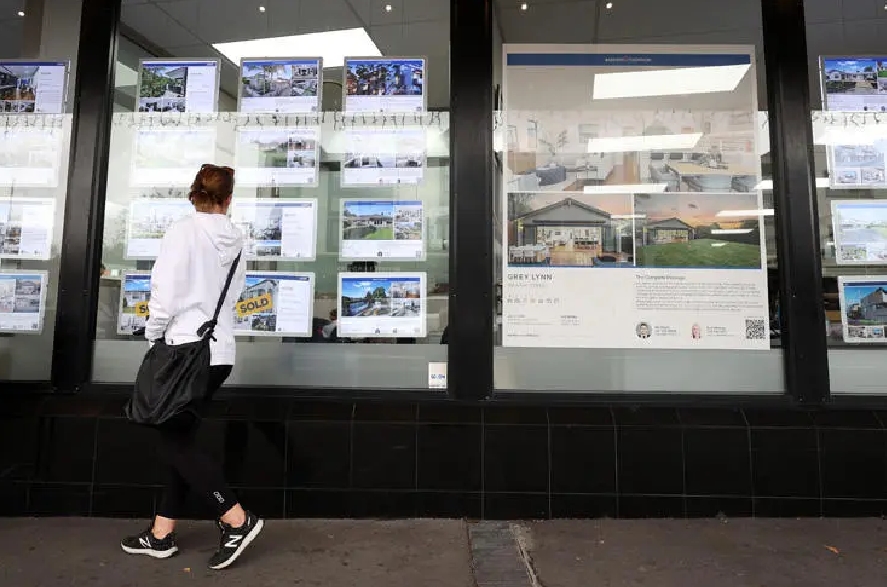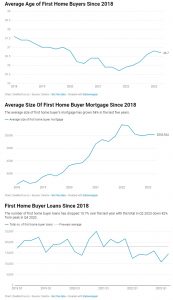
First-home buyers are getting older despite falling house prices
Houses may have been cheaper but the average age of first-home buyers went up during the market downturn, with the spike in interest rates and inflation the likely causes of the age increase.
OneRoof analysis of data supplied by credit bureau Centrix shows the average age of first-home buyers taking out a mortgage has risen 2% from a five-year low of 35.7 years in Q4 2021, when house prices were peaking, to 36.7 in Q2 2023.
The rise brought to an end the steady decline in first-home buyer ages since the start of 2018, when the average age of a new mortgage holder was 37.6 years.
The uptick in first-home buyer ages came at a time when interest rates were rising and cost of living pressures worsened, with the Official Cash Rate jumping from a low of 0.25% to 5.5% over roughly the same period and annual inflation rising from 1.5% to a peak of 7.3%, but now sitting at 6%.

The data also shows a sizeable increase in the size of first-home buyer loans. The average first-home buyer mortgage in Q1 2018 was $358,326. This rose to a peak of $591,734 in Q1 2022 but has subsequently dropped to $553,924 for Q2 2023 – up 54% on Q1 2018.
Centrix managing director Keith McLaughlin says the average age of the typical first-home buyer had been gradually falling but from 2022 the average age has been steadily rising, citing a tightening in the economy as the reason.
Long-term, the average age of first-home buyers in New Zealand has been climbing. In 1970 it was just 25. Worsening housing affordability has had a big impact on first-home buyers over the past generation but other factors have also come into play, say experts.
The increase in the number of Kiwis attending university over the last 50 years has pushed up the age at which Kiwis enter the workforce, while student loans have had an impact on the ability to save.
Another complication is the fact that Kiwis are marrying later. According to Stats NZ, the median age at first marriage or civil union in 2021 was 29.6 years for women and 30.7 years for men, compared with 27.5 and 29.3 respectively in 2001. In 1971 the median age at first marriage was 20.8 years for women and 23.0 years for men.
Stats NZ data also indicates that 64.5% of households owned their own homes in 2018, compared to the peak of 73.8% in the 1970s. The 2018 figure was the lowest since 1951.
Data for the age of first-home buyers does differ according to the methodology used. In 2021 CoreLogic and Equifax research noted that the average age of first-home buyers had been between 34 and 35 years from 2016 to 2020.
The research showed that the average first-home buyer age was lower in provincial areas, with the average age of first-home buyers in Manawatu, Masterton, Rangitikei and Timaru standing at 31.
”The figures haven’t been refreshed, but I’d be surprised if it’s changed massively since then,” CoreLogic head of research Nick Goodall told OneRoof this week. “In fact, the recent downturn may have meant some people can access the market a bit sooner than that age.”
Loan market mortgage adviser Lisa Meredith says there are drawbacks to buying later in life, including the ability to secure credit from the banks.
While some of her clients are buying in their 20s, she also gets first-home buyers in their 40s and 50s. The oldest first-home buyer she has had this year was aged 60.
Meredith says lenders pay particular attention to older first-home buyers who have a low deposit, such as 10%. and we can’t say that a particular bank will always have this policy.”
Once first-home buyers hit their 50s, banks are reluctant to lend for 30 years, says Meredith. Even at 25-year terms, banks want to see a clear exit strategy to ensure that the buyer can pay off the mortgage or sell down before getting too old, she adds.
Sometimes that exit strategy needs to be quite detailed before the bank will approve. “The [client] might say, ‘I will sell and move to the regions’. But there will often be a requirement to have a bit of detail around that.
“Another factor the banks will take into account is occupation. If you’ve got someone who is 55 and is doing a very manual job, such as a builder, what are the chances of them being so physically fit to be an effective builder at 75? It’s quite different to someone who is maybe a consultant,” she says.
“Another thing to be wary of if you are buying [your first home] in your 40s and 50s, and you’re using KiwiSaver, which most people do, is how’s that going to look for them in retirement? They clear out the KiwiSaver at 50, and only have 15-20 years to rebuild that. That becomes a bit of a problem.”

주택 가격 하락에도 불구, 주택 구매자의 평균 연령은 상승해
주택 가격이 낮아지긴 했지만 시장 하락 기간 동안 첫 집 구매자의 평균 연령은 상승했다.
이는 금리와 인플레이션의 증가로 평균 연령이 높아진 원인으로 보인다.
OneRoof가 신용 기관 센트릭스가 제공한 데이터를 분석한 바에 따르면 모기지를 통해 처음으로 주택을 구매한 사람들의 평균 연령은 2021의 5년 최저치인 35.7세에서 상승하여 2023에 36.7세로 증가했다. 이는 주택 가격이 정점을 찍었던 2021년 하반기부터 시작된 첫 집 구매자의 평균 연령 감소세를 끝냈다.
첫 집 구매자의 평균 연령 상승은 금리 상승과 생활비 부담 증가와 동시에 발생했다. 공식 현금 금리가 0.25%에서 5.5%로 크게 상승하고 연간 인플레이션도 1.5%에서 7.3%까지 상승한 뒤 현재는 6%로 안정화되었다.
데이터는 또한 첫 집 구매자 대출 규모의 상당한 증가를 보여주고 있다. 2018년 Q1의 평균 첫 집 구매자 모기지는 $358,326달러였다. 이는 2022년 Q1에 $591,734달러까지 상승한 뒤 2023년 Q2에 $553,924달러로 하락하여 2018년 Q1 대비 54% 증가했다.
센트릭스 대표인 키스 맥로플린은 전형적인 첫 집 구매자의 평균 연령이 점차 감소하고 있었지만 2022년부터 경제의 완화로 인해 평균 연령이 꾸준히 높아지고 있다고 언급하며 그 이유로 경제가 긴장되고 있다고 언급했다.
장기적으로 뉴질랜드의 첫 집 구매자 평균 연령은 높아지고 있다. 1970년에는 25세에 그치던 반면 주택 가격 부담이 지난 세대의 첫 집 구매자에게 큰 영향을 미쳤지만 전문가들은 다른 요인들도 작용하고 있다고 언급했다.
지난 50년 동안 대학에 다니는 뉴질랜드 시민 수의 증가로 뉴질랜드 시민이 진출하는 나이가 상승했으며, 학자금 대출은 저축 능력에 영향을 미쳤다.
또 다른 복잡한 요인으로는 뉴질랜드 시민들의 결혼 연령이 늦어진다는 것이다. 통계청에 따르면 2021년 여성의 첫 결혼 또는 사실혼의 평균 연령은 각각 29.6세와 30.7세로, 2001년에는 각각 27.5세와 29.3세였다. 1971년에는 여성의 첫 결혼 평균 연령이 20.8세, 남성의 경우 23.0세였다.
통계청 데이터는 2018년에 가구의 64.5%가 자신의 주택을 소유했음을 나타내었으며, 1970년대의 73.8% 피크에 비해 낮았다. 2018년 수치는 1951년 이후 최저였다.
첫 집 구매자의 연령 데이터는 사용된 방법에 따라 차이가 있다. 2021년에는 CoreLogic와 Equifax의 연구에서 2016년부터 2020년까지의 평균 연령이 34~35세 사이였음을 밝혔다.
이 연구에 따르면 시골 지역에서는 첫 집 구매자의 평균 연령이 낮았으며, Manawatu, Masterton, Rangitikei 및 Timaru의 평균 연령은 31세였다.
CoreLogic의 연구 담당자인 닉 굿올은 “이 수치는 갱신되지 않았지만 크게 변한 것으로 생각하지는 않을 것이다. 실제로 최근의 하강세로 인해 몇몇 사람들이 그 연령보다 조금 더 빨리 시장에 진입할 수도 있다.”라고 이번 주에 OneRoof 에서 말했다.
대출 시장 모기지 자문가 리사 메레딧은 중년의 나이에 주택을 구매하는 것에는 신용 기관에서 신용을 확보하는 능력을 포함한 단점들이 있다고 언급했다.
일부 고객은 20대에 주택을 구매하지만, 그 외에도 40대와 50대의 첫 집 구매자가 등장하고 있다. 리사는 올해 그녀의 고객 중 가장 나이 많은 첫 집 구매자는 60세였다고 말하며 노년으로 갈수록 저축하는데 어려움을 겪는 점을 강조했다. 일부 첫 집 구매자는 10% 와 같은 낮은 예치금을 가지고 있는 노년층이다.
첫 집 구매자가 50대에 접어들면 은행은 30년 대출을 주저하는 경향이 있다고 메레딧은 설명했다. 심지어 25년 대출 조건에서도 은행은 구매자가 모기지를 상환하거나 나이가 많아지기 전에 판매할 수 있는 명확한 방법을 보기를 원한다.
가끔 은행이 승인을 내기 위해 상세한 탈출 전략이 필요할 때도 있다. 메레딧은 ” 집을 판매하고 지방으로 이주할 것이라는 세부계획을 은행에 언급해야할 수도 있다. ” 그녀는 또한 “은행이 고려하는 또 다른 요인은 직업이다. 55세이고 건설업과 같은 매우 수동적인 직업을 하고 있는 사람의 경우 75세에도 효과적인 건설인이 될 가능성은 어떨까? 이는 상담사와 같은 직업을 하는 사람과는 크게 다르다.”라고도 덧붙였다.
“또 다른 사항은 40대와 50대에 주택을 구매하려고 키위세이버(KiwiSaver)를 미리사용하는 경우이다. 대부분의 사람들이 키위세이버를 사용하여 주택을 구매하는데 그것이 그들의 노후에 어떻게 보일지를 생각해야 한다. 50세에 키위세이버를 정리하고 15~20년 동안 다시 저축을 해야 하는 문제가 발생할 수 있는 것이다.”
